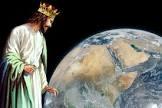
At the end of the Church’s year we reflect on what the kingship of Jesus Christ really means and how his dominion will be finally established at the end of time. In today’s gospel, two worlds collide. On the one hand, Pontius Pilate was a representative of the vast Roman Empire, which subjected diverse peoples with its military might. Worldly power was all-important; the Emperor was worshipped as a god. It was the world that Satan promised to give to Jesus if he would worship him. In contrast, Jesus did not seek to dominate but to serve, to the extent that he washed his disciples’ feet. His power lies not in conquest but in the humiliation of the cross. In both John’s Gospel and the Apocalypse he is pictured as a lamb - the gentlest of animals - that was sacrificed at Passover. His kingdom is one where good is done, where the poor, the homeless, the outcast and refugees are cared for, and where people receive justice. It is the world of the Beatitudes.
Yet Jesus is king of all, sheep and goats, bad and good. The feast of Christ the King was established by Pope Pius XI in 1925 in response to growing secularism and nationalism. It is as relevant to today as it was then. We think of the many dictators who oppress their people and imprison anyone who opposes them. Jesus reigns in all those who bravely raise their voices in protest, in spite of the threat to their lives.
“Crown Him with many crowns,
the Lamb upon his throne.”
(Matthew Bridges & Godfrey Thring)